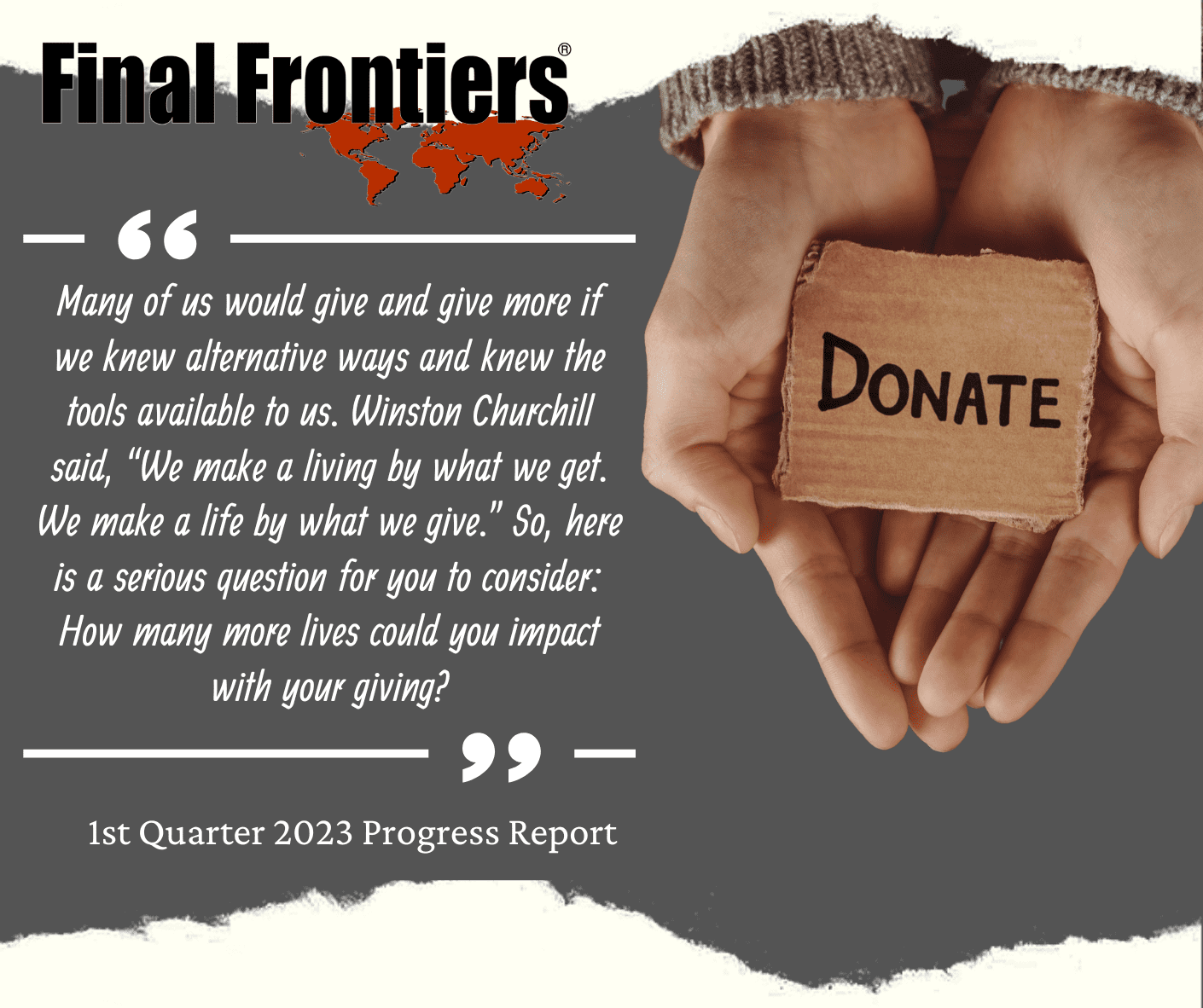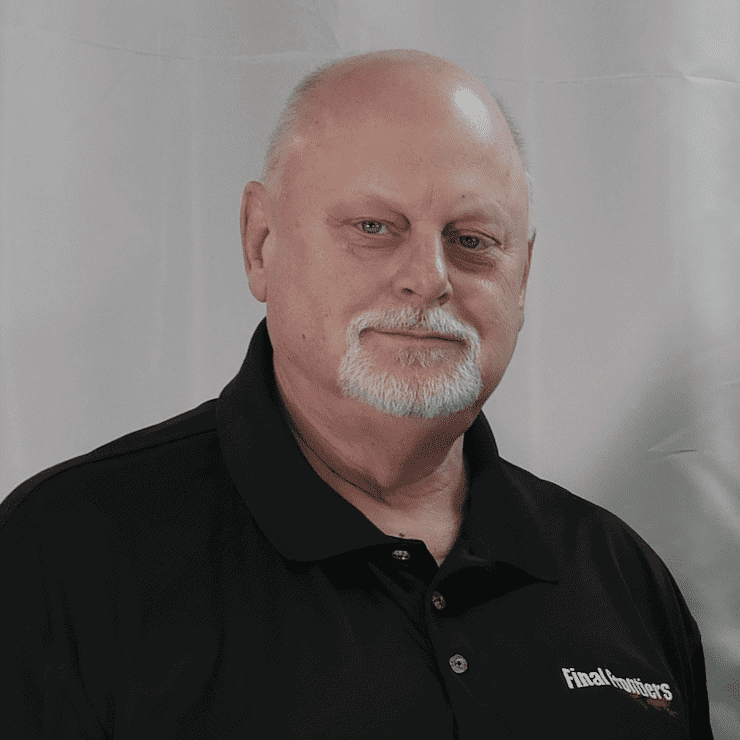Financial Planning can produce enhanced reserves for your senior years, an increased legacy for your dependants, and continued support of the ministries you loved in life long after your death.
A preface from Jon Nelms:
Occasionally we will hear from a family that has supported our work for decades and express that they want to continue doing so after this life. But how?
Then there are those who, like me, have never had professional assistance in financial planning for retirement or old age. Why not?
And there have been occasions when someone told me they had left Final Frontiers in their will, but we never received it. As it turned out, their will was not strong enough to fulfill their wishes, and their wealth went to relatives whose beliefs and lifestyles they did not approve of. Yet, there were guaranteed ways to prevent that.
This article has been written by Mr. Scott Vignere, a financial planner working in the Chicago area, who is capable of helping you, or finding someone in your area who can, at an acceptable price.
Scott is a graduate of my alma matar, Hyles Anderson College. He told me that he was preparing to be a pastor but did not feel called of God to do so. When he counseled with is pastor, Jack Hyles, he was advised to go into financial planning and did so. Now for forty-plus years that has been has profession. In late 2022 I was invited to speak at Graceway Bible Baptist Church in DeMotte, IN, where my good friend Caleb Hon pastors. Scott is a member of the church, and we met once again.
Scott told me that he had been patiently waiting for a ministry to which he could dedicate his financial planning skills, helping donors and sponsors to organize their personal finances better and, hopefully, find resources to contribute to their ministry of choice, even after death. I told him that we had been looking for someone for years who was skilled and reputable to fill that function for us.
Having spent months vetting each other, I felt comfortable recommending his services to you if you so choose. We then asked Scott to write a short article explaining his purpose and plan of assisting others with his financial planning skills and expertise.
Here is what he wrote.
“I don’t have any money.” We often feel that way, don’t we? Especially when it comes to giving. Our goal is to share with you the many tools and concepts available to someone who wants to give but does not know how to go about doing it. Giving doesn’t always mean writing a check or using a credit card. Many of us would give and give more if we knew alternative ways and knew the tools available to us. Winston Churchill said, “We make a living by what we get. We make a life by what we give.” So, here is a serious question for you to consider: How many more lives could you impact with your giving?
To start, let’s differentiate between charitable giving and charitable planning. For our purposes, we will define charitable giving as a short-term and often one-time event. For example, let’s say your accountant says you need a tax deduction this year. So, to comply with the accountant’s suggestion, you mail a check to some nonprofit seen on TV or heard on the radio. Done. You secured your necessary deduction for that year.
Conversely, charitable planning is more about developing a long-term plan to benefit your family and a charity or foundation of your choice. This benefit can be current or after you’ve passed on. And in addition to helping the organization of your choice, you will, in some cases, receive a more significant advantage than from a typical deduction. Besides the tax advantages, let’s focus a moment on the impact that you could make. Your contribution could, for example, affect whether the charity you designated could dig a well to provide water in a remote village (Village A). With a well provided, there could be many opportunities to share the Gospel. But if there is no well, the villagers are forced to walk miles for fresh water from a stream or trek to another village (Village B) with a well. Unfortunately, that Village B may be hostile to the Gospel. This reality would dramatically reduce the opportunity to reach Village A with the Gospel. This is just an example, but actual cases are very similar. Or, in another example, your gift could help a national pastor focus on growing his church and evangelizing other villages. Currently, he is forced to work full-time and hindered in evangelizing only when time allows. Again, this is an actual case. God has given you an unrealized power to give by careful charitable planning and giving, and through your gift, precious souls can come to Christ. Is there anything better?
Moving forward, let’s keep this thought in mind. Charitable planning is about partnering with God to lead people to know Jesus as their Savior. I get excited just writing this! How or whom do you want to help – today and long-term — even after your passing?
In partnering with God, you may not be aware of many tools available. Of course, as mentioned, one can always give cash by writing a check or using a money order or credit card, etc. But one can also give real estate, stocks, options, business assets, and other property types. The type of asset determines to a large degree what tool you can use. Some tools we can help you examine are Donor Advised Funds (not donor controlled,) Charitable Remainder Trusts, Charitable Gift Annuities, Pooled Income Funds, and more.
It is essential to do careful planning first. Sometimes, clients become infected with FOMO Syndrome (Fear of Missing Out). For example, when clients rush to make transfers to beat a new tax bill or some other deadline, they worry that if they don’t move fast enough, they’ll miss out on opportunities to reduce their estate taxes before current exemptions expire.
It may be wise for a client to make a transfer. Still, suppose they haven’t done a proper cash flow analysis in advance, crafted proper legal trusts, or thoroughly considered the impact of an irrevocable transfer of considerable portions of their estate. In that case, they shouldn’t move forward. The damage to their estate can be incredible.
Let’s consider a real-world example. A high-net-worth family in the northeast with $50 million in assets had an inferior plan. This was because though they had basic revocable trusts in place, they were concerned with their children inheriting too much wealth before they were ready for the responsibility that goes with that windfall. They were also concerned about taxes and changes in tax laws. But they lived in a state where the rules did not favor good planning, and their current documents had been designed to distribute all their remaining wealth to their children at relatively young ages. Thus, their current plan provided for the distribution of funds, but it did not align with what they wanted to accomplish.
Disturbing as this situation may be, it is relatively common during our process of routine document review. Unfortunately, there was a disconnect between the trusts drafted and what the clients wanted. The newer, irrevocable trusts had the same distribution provisions as the revocable trusts. In other words, the children still would receive the assets sooner than the parents wanted and the parents would no longer have control of the assets. A much worse situation. Therefore, we caution clients to take a breath and wait for the planning to be completed. Then they can safely execute documents that follow their wishes rather than transferring assets they can never get back. While proposed legislation spurs millions of affluent Americans to act, such action must be well thought out. The following tax year will tell if it was.
When it was explained to the $50 million client that the funds he wanted to transfer irrevocably couldn’t be touched again in his lifetime, he paused and waited until new projections were run for him. The numbers showed he could both remain comfortably liquid and would never lack access to his capital for the balance of his life. Calm, patient thinking matters.
Admittedly, $50 million is not where most of us live, but the point remains that careful planning is imperative no matter the size of our estate.
Finally, we will address many of the questions we should be asking ourselves. First, some of the questions we should consider:
- What do you want for your children and grandchildren after you pass on?
- What do you think your children and grandchildren want from you when you pass on?
- What are three key things you want to pass on during your lifetime?
- Why are these important to you?
- What issues or concerns do you have that are unfinished?
- Are there others that could help you?
- Are you looking forward to hearing God the Father say to you, “Well done, thou good and faithful servant.”?
We have now begun a journey together — an adventure in giving. As we progress, we will also learn more about the tools available to advance the Kingdom of Heaven and impact the world.
Please note: It is imperative that you consult with a tax advisor and/or attorney when considering any of these concepts. In addition, it is critical that the attorney, tax advisor, and financial advisor are certified, knowledgeable and practiced in these areas. If you would like to speak with Scott or have his help finding such an advisor in your area, please give us a call at 800-522-4324
We have other articles on this subject such as:
Charitable Gift Annuities and their Potential Tax Benefits
An Exciting Look at Donor-Advised Funds














